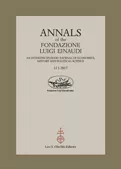This essay deals with the development of European projects during the short but crucial period between the First World War and the beginning of the Totalitarian Age. Only after the Great War, in fact, the European unity became a subject of debate among politically committed intellectuals, economists, cultural magazines, militant movements and even among the most conscious personalities of the ruling political elites throughout Europe. This topic has already been discussed by a well-known historiographical literature. In particular, this essay will focus on some questions: why did the European unity became a subject of cultural and political debate after the First World War? Who were the main protagonists that took part in this debate all across Europe? What kind of European projects did they propose and why did they fail to prevent the violent return of nationalism from the end of the 1920s until the catastrophe of the Second World War? And, finally, how these projects, despite their defeat, did influence the birth of new pro-European and federalist projects during the struggle against Totalitarianism and the European Resistance? Even the authors of the Ventotene Manifesto learned a lot from these pioneers of the European project, considering both their far-sighted proposals and their limits.



